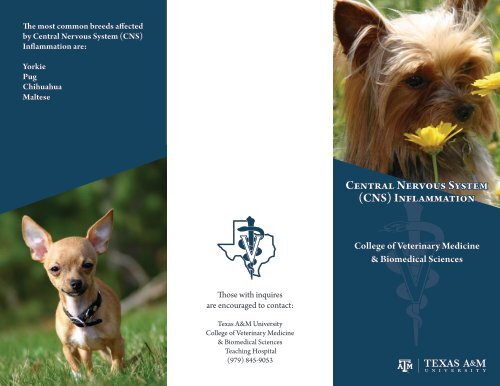Central Nervous System (CNS) Inflammation - College of Veterinary ...
Central Nervous System (CNS) Inflammation - College of Veterinary ... Central Nervous System (CNS) Inflammation - College of Veterinary ...
The most common breeds affected by Central Nervous System (CNS) Inflammation are: Yorkie Pug Chihuahua Maltese Those with inquires are encouraged to contact: Texas A&M University College of Veterinary Medicine & Biomedical Sciences Teaching Hospital (979) 845-9053 Central Nervous System (CNS) Inflammation College of Veterinary Medicine & Biomedical Sciences
The most common breeds affected<br />
by <strong>Central</strong> <strong>Nervous</strong> <strong>System</strong> (<strong>CNS</strong>)<br />
<strong>Inflammation</strong> are:<br />
Yorkie<br />
Pug<br />
Chihuahua<br />
Maltese<br />
Those with inquires<br />
are encouraged to contact:<br />
Texas A&M University<br />
<strong>College</strong> <strong>of</strong> <strong>Veterinary</strong> Medicine<br />
& Biomedical Sciences<br />
Teaching Hospital<br />
(979) 845-9053<br />
<strong>Central</strong> <strong>Nervous</strong> <strong>System</strong><br />
(<strong>CNS</strong>) <strong>Inflammation</strong><br />
<strong>College</strong> <strong>of</strong> <strong>Veterinary</strong> Medicine<br />
& Biomedical Sciences
<strong>Central</strong> nervous system (<strong>CNS</strong>) inflammation is<br />
a common cause <strong>of</strong> neurological disease in dogs<br />
and cats. The term meningitis is used when the<br />
lining surrounding the <strong>CNS</strong> is affected. The terms<br />
encephalitis and myelitis refer to inflammation <strong>of</strong><br />
the brain and spinal cord, respectively.<br />
Dogs and cats with <strong>CNS</strong> inflammation can exhibit<br />
a variety <strong>of</strong> abnormalities. These may include<br />
behavioral change, weakness, abnormal limb<br />
coordination, blindness, and seizures. Some<br />
animals can have signs that develop over weeks<br />
or months, whereas others appear to be suddenly<br />
affected. There are many diseases that can mimic<br />
<strong>CNS</strong> inflammation such as tumors, strokes,<br />
malformations, and metabolic abnormalities.<br />
Appropriate testing is required to diagnose<br />
<strong>CNS</strong> inflammation and determine the type <strong>of</strong><br />
inflammatory disease.<br />
Animals suspected <strong>of</strong> <strong>CNS</strong> inflammation usually<br />
receive blood cell counts, blood chemistry tests,<br />
nervous system imaging, spinal fluid evaluation,<br />
and testing for infectious disease. Magnetic<br />
resonance imaging (MRI) is the preferred means<br />
<strong>of</strong> imaging the <strong>CNS</strong>. It provides clear pictures<br />
<strong>of</strong> the brain and spinal cord and is the only way<br />
to diagnose many diseases that can mimic <strong>CNS</strong><br />
inflammation, such as stroke. At Texas A&M<br />
University, MRIs are acquired and read by<br />
radiologists and clinicians with years <strong>of</strong> experience<br />
and a national reputation for innovating this<br />
technology.<br />
Research performed at Texas A&M University,<br />
the University <strong>of</strong> Georgia, and elsewhere has<br />
highlighted that the majority <strong>of</strong> dogs with <strong>CNS</strong><br />
inflammation do not have active infection at the<br />
time <strong>of</strong> diagnosis. Most dogs appear to have<br />
abnormal immune system responses, which result<br />
in the disease process. Animals with immune-<br />
based <strong>CNS</strong><br />
inflammation<br />
typically require<br />
drugs that slow<br />
down the immune<br />
system. With<br />
properly tailored<br />
treatment these<br />
animals can live<br />
for years with<br />
excellent quality<br />
<strong>of</strong> life. Cats with<br />
<strong>CNS</strong> inflammation <strong>of</strong>ten have active infection and<br />
may respond to treatment with antibiotics or other<br />
drugs.<br />
Some animals with <strong>CNS</strong> inflammation can<br />
have seizure disorders. Although seizures can<br />
be distressing to owners, they can usually be<br />
controlled (but not entirely eliminated) with<br />
medications. Newer anti-seizure drugs are easy<br />
to use and likely have fewer side effects when<br />
compared to older standard medications.<br />
Did You Know?<br />
About the breed on the cover...<br />
An adorable member <strong>of</strong> the toy dog group, the<br />
Yorkshire Terrier is a mixture <strong>of</strong> England’s finest<br />
terriers, made up <strong>of</strong> the Clydesdale terrier, English<br />
black and tan terrier, waterside terrier, and the<br />
Paisley terrier. What a noble background!<br />
By the late 1800s, Yorkies had made their<br />
way to America but because there were so many<br />
variety <strong>of</strong> sizes, the Yorkshire Terrier did not make<br />
its exclusive name until the early 1900s. It was<br />
at this point that the majority <strong>of</strong> Yorkie breeders<br />
decided that the smaller sized Yorkshire Terrier<br />
was preferable.<br />
Finally, animals with <strong>CNS</strong> inflammation may<br />
require intensive care unit-type care if they<br />
are severely affected. Treatments may need to<br />
be administered that can<br />
decrease brain swelling and<br />
lower the pressure within<br />
the skull. Intravenous<br />
treatments to suppress the<br />
immune system may also<br />
be required. Round the<br />
clock nursing care,<br />
board certified critical<br />
care specialists,<br />
and ready access<br />
to a team <strong>of</strong><br />
specialists can<br />
be essential<br />
in giving this<br />
patient group<br />
the best<br />
chance for<br />
recovery.<br />
Yorkies have a terrific personality! They are<br />
known to be bold, confident, and courageous.<br />
Although small in size, they pack a tremendous<br />
amount <strong>of</strong> personality into their small package.<br />
And the Yorkshire Terrier seems to be oblivious<br />
to its small stature, and you’ll <strong>of</strong>ten see them<br />
play with much bigger dogs with no fear. Always<br />
eager for fun and adventure, this dog can be a bit<br />
aggressive towards other small animals and strange<br />
dogs. It definitely maintains that old rough-edged<br />
terrier spirit.



